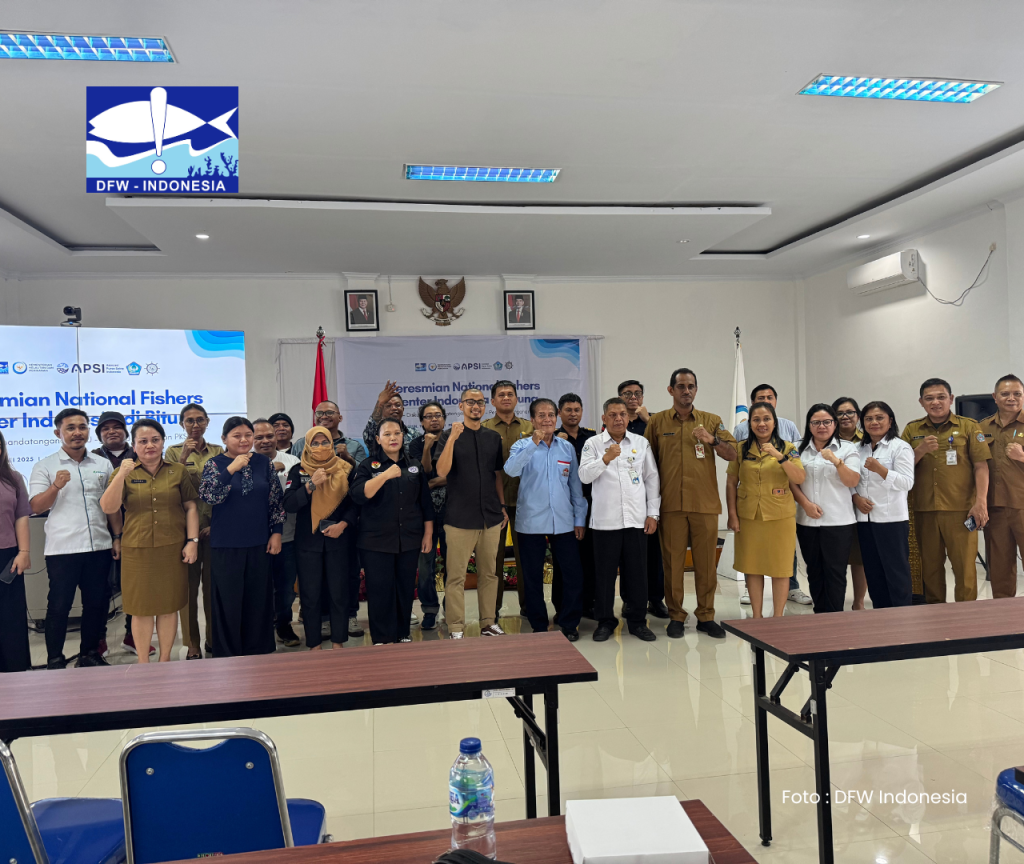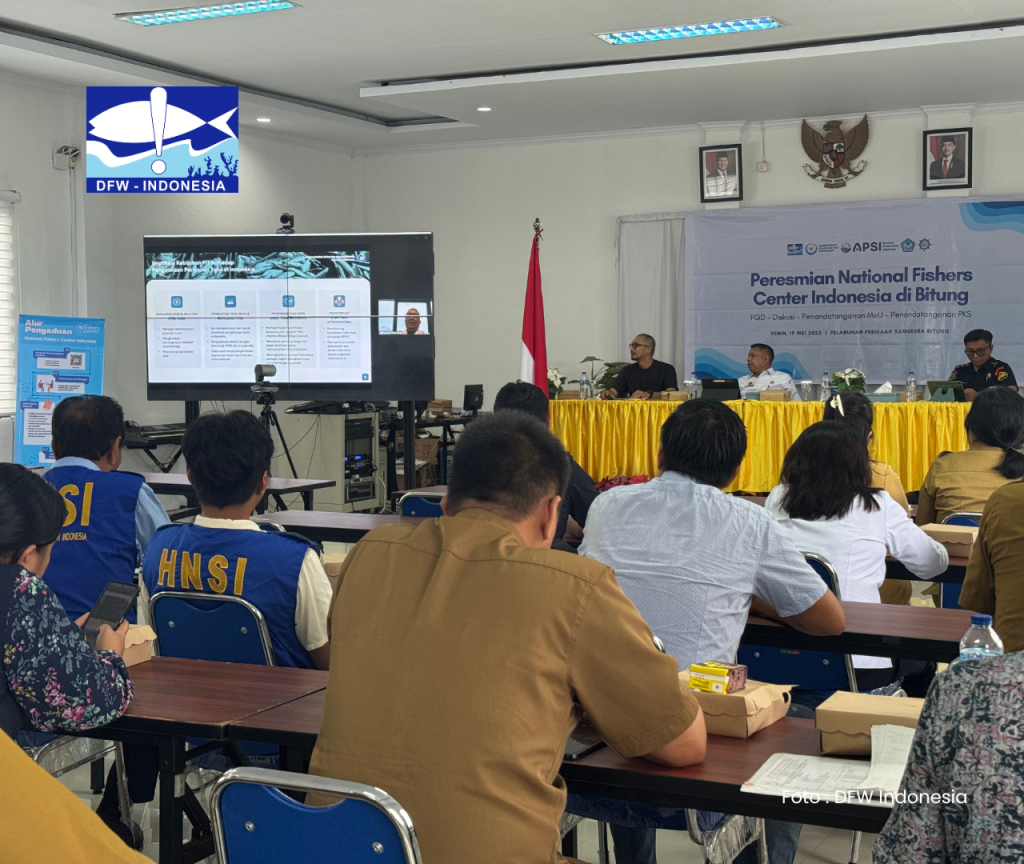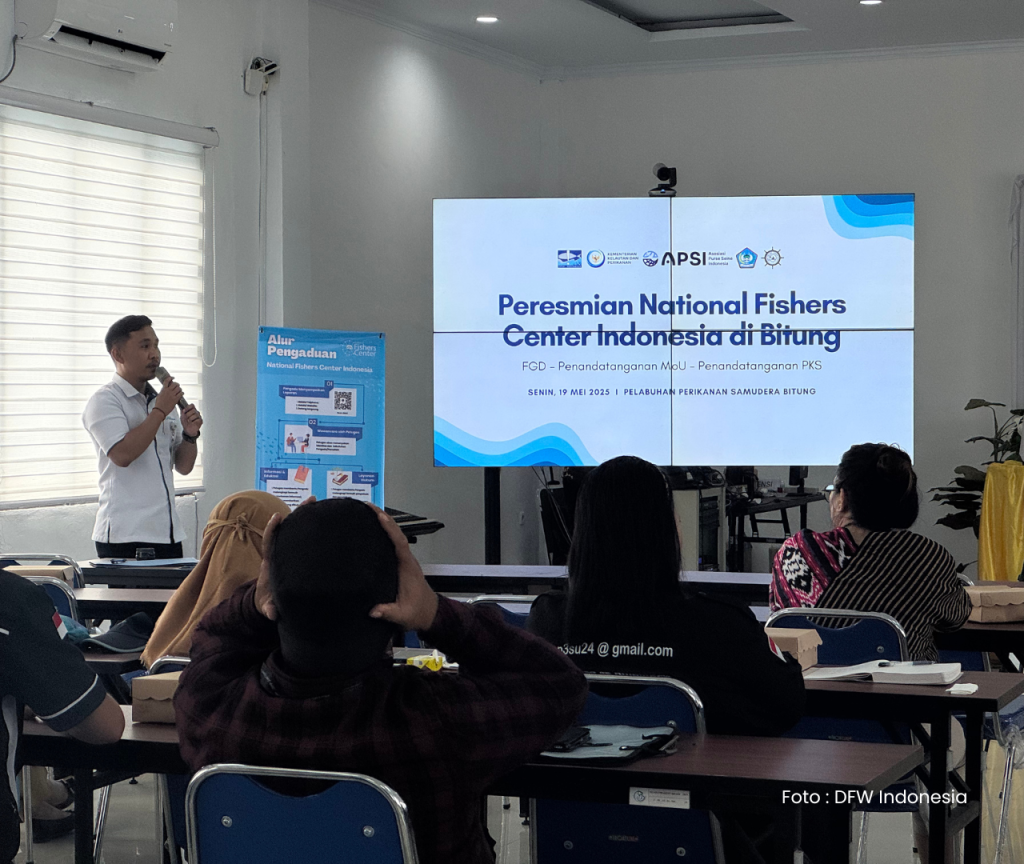Bitung, May 19th, 2025 – North Sulawesi is one of the largest tuna-producing provinces in Indonesia. Bitung City, as the center of the fisheries industry in the province, plays a strategic role in both national and international tuna supply chains. However, the tuna fisheries sector in North Sulawesi faces various challenges, including the implementation of the Measurable Fishing Policy (PIT), which regulates fishing zones and quotas as well as the protection of fisheries workers.
Destructive Fishing Watch (DFW) Indonesia officially launches National Fishers Center (NFC) Indonesia in Bitung, North Sulawesi. This launching represents DFW Indonesia’s tangible commitment to improving knowledge and protection for fisheries workers in Indonesia through strategic collaboration with various stakeholders. The event was attended by representatives from stakeholders such as the Bitung Oceanic Fishing Port (PPS), the North Sulawesi Marine and Fisheries Office, the North Sulawesi Department of Manpower and Transmigration, the Indonesian Purse Seine Association (APSI), BPJS Ketenagakerjaan (Social Security Agency for Employment), the North Sulawesi HNSI (Indonesian Fishermen’s Association), and the North Sulawesi Fisheries Crew Union (SAKTI – SULUT).
NFC Indonesia serves as a platform for fisheries workers to access information, education, and report grievances. These issues often relate to the vulnerability of fisheries workers, which can be linked to forced labor and human trafficking, both domestically and internationally. The NFC in Bitung will offer four core services: Information and Education, Case Reporting, Capacity Building, and Legal Referral and Assistance.
“In the past five years, at least 84 cases have been recorded in the Bitung area by NFC. The establishment of the National Fishers Center Indonesia in Bitung is part of our commitment to support a sustainable fisheries sector,” said Imam Trihatmadja, Program Director of DFW Indonesia, during his remarks at the Bitung Oceanic Fishing Port office.
The inauguration also included the signing of several Memoranda of Understanding (MoUs) with PPS Bitung and APSI, as well as a cooperation agreement with SAKTI – SULUT. These agreements are expected to strengthen inter-agency synergy in achieving the goal of better protection for fishers and fisheries workers in Bitung City.

Additionally, a Focus Group Discussion (FGD) titled “Prospects for Sustainable Tuna Management in North Sulawesi” was held during the event. The discussion aimed to identify challenges and opportunities for sustainable tuna management in the region and to formulate inclusive and sustainable policy recommendations.
Speakers included:
- Dr. Syahril Abd. Raub, Director of Fish Resources Management at the Directorate General of Capture Fisheries, Ministry of Marine Affairs and Fisheries
- Ruth Goni, Functional Expert in Capture Fisheries Production Management at the North Sulawesi Marine and Fisheries Department
- Nilmawati, from the IPNLF Indonesia Foundation
- Andre S. Mansur, from BPJS Ketenagakerjaan Bitung
Makassau, Head of PPS Bitung, expressed that this initiative reflects growing trust in Bitung as Indonesia’s tuna hub. PPS Bitung is committed to sustainable tuna management based on four principles: stopping Illegal, Unreported, and Unregulated Fishing (IUUF), stopping human trafficking, ending slavery at sea, and preventing forced labor. Still, he noted that achieving sustainable tuna management also requires the national implementation of the PIT policy across various Fisheries Management Areas (WPP).
Syahril explained that the current PIT implementation should be discussed in more detail, tailored to each WPP’s conditions. In WPPs 713, 714, and 715, a Harvest Strategy is already in place, but its execution still needs optimization.
“Tuna catch quotas have been set by Regional Fisheries Management Organizations (RFMOs). Indonesia currently exceeds its allowed catch quota, so it must be reduced. This is part of our effort to improve Indonesia’s credibility for international cooperation,” said Syahril.
Beyond PIT, attention to fishers’ welfare is also vital in the pursuit of sustainable tuna management. Nilmawati emphasized the importance of a grievance mechanism to ensure the well-being of fishery workers.
“The adoption of grievance mechanisms must be expanded because there is no sustainable fishery without fishers who understand that their rights must be upheld, just like any other workers,” she stated.

Andre added that fulfilling fishers’ social security rights is another key aspect of welfare. PPS Bitung could collaborate with BPJS Health to ensure fisheries workers’ rights to social protection are upheld.
Ruth concluded by affirming Bitung City’s commitment to strengthening its fisheries business ecosystem. She highlighted that 11 out of 16 of Bitung’s flagship programs support the fisheries sector. This commitment is aimed at making the marine and fisheries sector a cornerstone of Indonesia’s national development, based on the sustainable use of marine resources.










